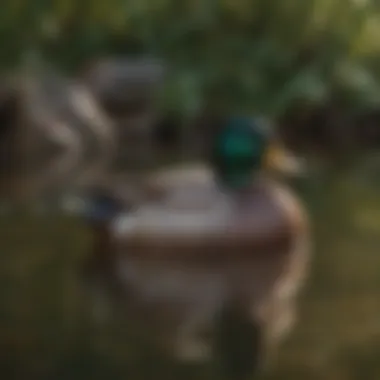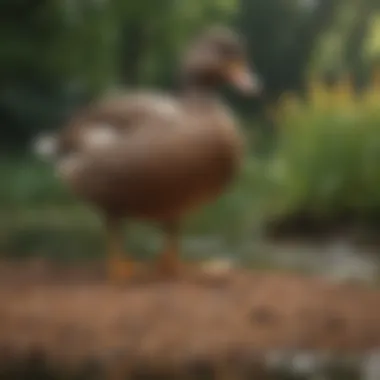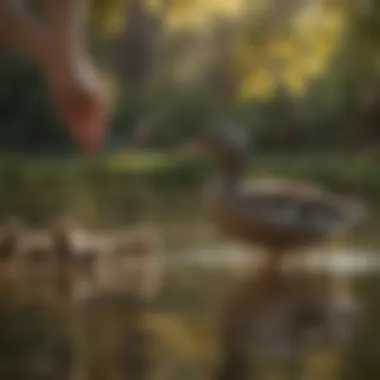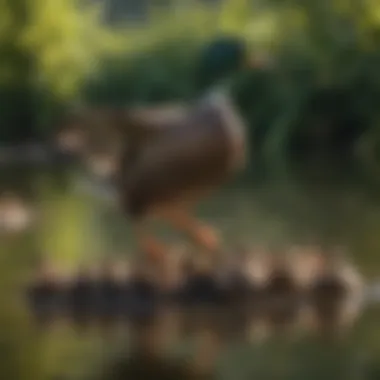A Comprehensive Guide on Feeding Ducks at the Park: Tips and Recommendations


Overview of Feeding Ducks at the Park
When feeding ducks at the park, it is crucial to consider a variety of factors to ensure the well-being of the ducks and the ecosystem. This comprehensive guide will delve into suitable food choices, feeding etiquettes, and the importance of maintaining a balanced ecosystem for a fulfilling park experience.
Introduction to Feeding Ducks at the Park
Feeding ducks at the park is a popular recreational activity that attracts people of all ages. However, it is essential to understand the significance of providing appropriate food to ducks and the potential impact on their health and the environment.
Suitable Food Choices
Choosing the right food for ducks is paramount to their health and well-being. Options like whole grains, peas, and corn are ideal choices, promoting a balanced diet for the ducks without compromising their digestive systems.
Feeding Etiquettes
Feeding etiquettes play a crucial role in ensuring a positive experience for both the ducks and other park visitors. Avoid overfeeding, as it can lead to health issues for the ducks and cause imbalances in the park's ecosystem.
Ecosystem Well-being
Maintaining the park's ecosystem is vital for the overall health of the ducks and other wildlife. By feeding ducks responsibly and respecting their natural diet, visitors contribute to the preservation of a sustainable ecosystem.
Current Status of Duck Feeding Practices
The current state of duck feeding practices in parks may present challenges due to the widespread use of inappropriate food items. Understanding the existing feeding habits and their implications is essential in implementing positive changes for the well-being of ducks.
Challenges in Duck Feeding Activities
Challenges in duck feeding activities include the lack of awareness regarding suitable food choices, leading to potential health issues for ducks. Identifying these challenges is the first step towards implementing effective solutions.
Sustainable Solutions for Duck Feeding
Exploring sustainable solutions such as educational campaigns on appropriate duck feeding and creating designated feeding areas can help address the challenges faced in duck feeding activities. By promoting responsible feeding practices, visitors play a key role in ensuring the sustainability of duck populations in parks.
Impact of Duck Feeding on Ecosystems
The impact of duck feeding extends beyond the immediate environment, affecting ecosystems, water quality, and wildlife populations. Understanding the broader repercussions of improper feeding practices emphasizes the need for adopting sustainable approaches.
Importance of Conservation Efforts


Conservation efforts in park settings are crucial for safeguarding the well-being of ducks, preserving biodiversity, and promoting environmental sustainability. By raising awareness about the importance of responsible duck feeding practices, communities contribute to the long-term conservation of park ecosystems.
Introduction
Feeding ducks at the park is not just a leisure activity; it is a critical aspect of ensuring the health and well-being of these feathered inhabitants and the overall ecosystem. Understanding the intricacies of duck diets and feeding etiquettes is paramount to maintaining a harmonious environment for both ducks and park visitors. This comprehensive guide aims to shed light on the nuances of providing sustenance to ducks at the park, emphasizing the significance of responsible feeding practices and the potential environmental impacts. By delving into the natural diet of ducks, their nutritional requirements, and suitable food choices, this article seeks to equip conservationists, students, and environmentalists with the knowledge needed to make informed decisions while interacting with these avian companions. Let us embark on a journey to navigate the realms of feeding ducks at the park, unraveling the complexities that lie beneath the serene surface of this seemingly simple activity.
Understanding Duck Diets
Feeding ducks at the park is not just about tossing any food their way; it requires a deep understanding of a duck's dietary needs and preferences. This section delves into the crucial role that diet plays in the overall well-being of ducks and the ecosystem. By comprehending what ducks naturally consume and the essential nutrients they require, one can ensure a healthy and balanced diet for these delightful creatures.
Natural Diet of Ducks
Ducks in their natural habitat forage for a variety of foods such as aquatic plants, insects, small fish, and algae. This diverse and nutrient-rich diet is essential for their growth, development, and overall health. Understanding the natural diet of ducks provides valuable insights into replicating these conditions in park settings to promote their well-being.
Nutritional Needs of Ducks
Ducks have specific nutritional requirements to thrive, including an ideal balance of macronutrients and essential vitamins and minerals. Maintaining this balance is crucial for their growth and immune function. By offering foods rich in these nutrients, we can support the health and vitality of park-dwelling ducks.
Ideal Macronutrient Balance
Achieving the ideal balance of macronutrients, including proteins, carbohydrates, and fats, is paramount for duck health. Proteins aid in muscle development, while carbohydrates provide energy. Fats play a role in insulation and energy storage. Understanding and providing this balance promotes optimal health and growth in ducks.
Essential Vitamins and Minerals
Essential vitamins and minerals are vital for ducks' overall well-being, supporting functions such as growth, immunity, and reproduction. Incorporating foods rich in these nutrients ensures ducks receive the necessary building blocks for a strong and healthy life. By understanding the role of each vitamin and mineral, we can tailor their diet for maximum benefit.
Foods to Avoid
Certain foods, despite being readily available, can be harmful to ducks. It's essential to be aware of these items to prevent harm and maintain their well-being. By avoiding bread and processed foods as well as salty snacks, we safeguard the health of park ducks and contribute positively to their ecosystem.
Bread and Processed Foods
Bread and processed foods lack the nutritional value ducks require and can lead to health issues such as malnutrition and obesity. It's vital to opt for healthier alternatives to support their optimal health and vitality.
Salty Snacks
Salty snacks may disrupt a duck's electrolyte balance, leading to dehydration and kidney problems. Steering clear of these items ensures that ducks maintain their health and vitality while enjoying treats that are beneficial and safe. By being mindful of what not to feed ducks, we can cultivate a sustainable feeding environment for these charming waterfowl.
Best Foods to Feed Ducks


Feeding ducks at the park requires meticulous consideration of the type of food offered. The section 'Best Foods to Feed Ducks' within this comprehensive guide emphasizes the critical role that diet plays in the well-being of ducks. By focusing on providing suitable nutrition, park visitors can contribute to the overall health of the duck population. Understanding the importance of optimal nutrition in maintaining healthy ducks is vital for a sustainable park ecosystem.
Healthy Options
Cracked Corn
Cracked corn serves as a notable choice when selecting appropriate foods to feed ducks. Its high carbohydrate content ensures energy supply for the ducks, supporting their daily activities. The ease of digestion of cracked corn makes it a popular option among park visitors. However, excessive feeding of cracked corn should be avoided to prevent nutrient imbalances in ducks and maintain a diverse diet.
Peas
Peas provide an essential source of vitamins and minerals for ducks, contributing to their overall health and vitality. Their soft texture makes it easy for ducks to consume, especially for younger or older ducks. The high fiber content in peas aids in digestion, promoting gut health for the ducks. Including peas in their diet enhances the nutritional value of the food offered, ensuring a balanced diet for these aquatic birds.
Lettuce Leaves
Lettuce leaves offer a refreshing and hydrating option for ducks, particularly in warm weather. The high water content in lettuce helps keep ducks hydrated while providing essential nutrients. Easy to feed and digest, lettuce leaves are a suitable choice to supplement the diet of ducks. However, caution should be taken not to offer lettuce with high levels of pesticides, as it can be harmful to the ducks' health.
Suggested Duck Feed
Specialized Duck Pellets
Specialized duck pellets are formulated to meet the specific dietary requirements of ducks, ensuring they receive all essential nutrients. These pellets eliminate the risk of nutrient deficiencies, providing a convenient and balanced food option for park visitors to offer. The compact size of pellets makes them easy to carry and distribute, simplifying the feeding process while maintaining nutritional integrity.
Duck Mash
Duck mash offers a palatable and diversified option for feeding ducks, combining various grains and seeds to enhance nutritional value. The soft texture of mash is ideal for ducks of all ages, promoting ease of consumption. Its balanced composition provides a comprehensive mix of vitamins, minerals, and proteins, supporting the overall health and vitality of ducks. However, care should be taken to ensure the freshness of duck mash to prevent spoilage and maintain optimal nutritional content.
Feeding Etiquette
Feeding etiquette plays a crucial role in ensuring the well-being of ducks and maintaining the ecological balance at the park. By adhering to proper feeding practices, visitors contribute to the overall health and sustainability of the duck population. It is essential to understand the impact of feeding habits on the ducks' diet and behavior, as well as the potential consequences of inappropriate feeding practices. Demonstrating respect towards the wildlife and the environment reflects a responsible and conscientious approach to interaction.
Regulations at the Park
Parks often have regulations in place to govern the feeding of wildlife, including ducks. These rules are designed to protect the animals from harm and preserve the park's ecological integrity. By following these regulations, visitors contribute to maintaining a harmonious environment for both wildlife and park visitors. Compliance with park rules demonstrates a commitment to responsible stewardship and conservation efforts.
Responsible Feeding Practices
Moderation is Key


Moderation is a fundamental aspect of responsible feeding practices when interacting with ducks. By offering food in appropriate quantities, visitors help prevent overfeeding and potential health issues among the duck population. Moderation ensures that ducks receive a balanced diet while discouraging dependency on handouts. This practice promotes natural foraging behaviors and contributes to the ducks' overall well-being.
Avoid Feeding Other Wildlife
Avoiding the feeding of other wildlife is also essential in maintaining the ecological balance within the park. Feeding ducks specifically designated foods helps prevent competition with other species for limited resources. It also prevents potential conflicts and ensures that each species maintains its natural dietary habits. Respecting the boundaries between different wildlife populations fosters a sustainable ecosystem within the park.
Interaction with Ducks
Observe from a Distance
Observing ducks from a distance allows visitors to appreciate the animals' natural behaviors without causing disturbance. By maintaining a respectful distance, visitors minimize their impact on the ducks' natural habitat and reduce unnecessary stress. This approach encourages ducks to exhibit their natural behaviors and fosters a harmonious coexistence between wildlife and human observers.
Allow Ducks to Approach
Allowing ducks to approach voluntarily promotes a sense of trust between the animals and visitors. By giving ducks the choice to engage, visitors respect the animals' autonomy and create a positive interaction dynamic. This approach can lead to more authentic wildlife encounters and allows visitors to observe ducks in their natural state. Allowing ducks to approach on their terms contributes to a mutually beneficial relationship between ducks and park visitors.
Environmental Impact
Feeding ducks at the park entails a crucial consideration of the environmental impact it may have. The actions of park visitors can significantly affect the local ecosystem, and being mindful of this is paramount. By understanding the potential consequences of feeding habits, we can work towards a harmonious coexistence with nature. Delving into the effects of improper feeding sheds light on how seemingly innocuous actions can lead to detrimental outcomes.
Effects of Improper Feeding
Water Pollution
Water pollution is a pressing concern associated with improper feeding practices. When individuals discard food and waste irresponsibly, it can contaminate the water bodies where ducks reside. The introduction of foreign substances into these habitats disrupts the delicate balance of the ecosystem, posing risks to not only the ducks but also other wildlife in the area. Preventing water pollution demands a concerted effort to promote cleanliness and environmental awareness.
Nutritional Imbalance
Nutritional imbalance arises when ducks are consistently fed inappropriate food items, leading to health complications and disrupt the natural equilibrium. Ducks require a specific diet to thrive, and neglecting this can result in malnourishment and weakened immune systems. Prioritizing a balanced and nutritious feeding regime is essential for safeguarding the well-being of park wildlife and preserving the ecosystem's integrity.
Maintaining Cleanliness
Emphasizing the importance of maintaining cleanliness in park settings is pivotal for mitigating environmental impact. Proper waste disposal practices are imperative to prevent contamination and uphold the hygiene of duck habitats. Educating visitors on responsible waste management fosters a culture of environmental stewardship, fostering a sustainable environment for both wildlife and visitors.
Dispose of Waste Properly
Disposing of waste properly involves conscientious efforts to utilize designated bins and recycling facilities. By adhering to waste management guidelines, we can minimize litter accumulation and safeguard the natural beauty of park surroundings. Implementing proper disposal measures not only promotes cleanliness but also cultivates a sense of respect for the environment among park-goers.
Encourage Natural Foraging
Encouraging natural foraging practices among ducks stimulates their innate foraging instincts and promotes a healthier diet. Allowing ducks to seek out their own food sources fosters physical activity and reduces reliance on artificial feed. This not only benefits the ducks' overall health but also contributes to a more sustainable ecosystem where natural processes are upheld and respected.
Conclusion
In the realm of feeding ducks at the park, the conclusion plays a pivotal role in encapsulating the essence of this guide. As visitors interact with these feathered creatures, understanding the importance of responsible feeding practices becomes paramount. The conclusion serves as a beacon, highlighting the significance of maintaining a delicate balance between human enjoyment and environmental preservation. By emphasizing moderation and vigilance in feeding habits, individuals partaking in this activity contribute to the overall well-being of ducks and the surrounding ecosystem. Additionally, the conclusion underlines the necessity of fostering a harmonious relationship with nature, where humans coexist in harmony with wildlife. In essence, the conclusion brings together the intricate threads of duck feeding into a tapestry of coexistence and conservation, weaving a narrative of responsible stewardship and respect for the natural world.



